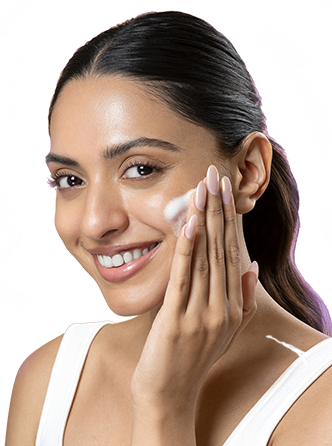
IN THIS ARTICLE
Retinol is a tried-and-true skincare ingredient, renowned for its impressive anti-aging benefits. It helps reduce wrinkles, fight acne, and improve skin texture, making it a versatile addition to any routine for healthier, smoother skin.
However, while it enjoys a lot of praise for its skin’s benefits, there’s a persistent question: Does retinol thin the skin?
Unfortunately, this concern increases skepticism among new users, with even skincare enthusiasts being hesitant to utilize it to its best.
So, let’s clear some doubts.
Here is all about the science behind retinol and its benefits.
Let’s debunk the myth of skin thinning with evidence-based clarity.
What is retinol and how does it work?
Retinol is a derivative of vitamin A, an essential nutrient crucial for your body and skin health. It belongs to the retinoid family, which also includes compounds like retinoic acid and tretinoin.
While retinoid and tretinoin have similar benefits, like retinol, the latter is a mild component and is found in over-the-counter skincare products.
When applied, retinol is converted into retinoic acid by enzymes in the skin. This active form stimulates cellular turnover and boosts collagen production, helping repair skin damage and maintain youthful, healthy skin.
What is the difference between retinoids, retinol, and tretinoin?
Retinoid is the umbrella term for all vitamin A derivatives used in skincare, famous for their anti-aging and skin-renewing benefits. Retinol and tretinoin are specific types of retinoids, with retinol being available over-the-counter and tretinoin being a more potent, prescription-strength derivative.
Retinol benefits for the skin
Retinol isn’t a favorite just because celebs and derms rave about it—it’s got scientific claims to back up its benefits!
Here are some benefits of retinol you need to know.
1. Boosts collagen production
Collagen is the skin’s structural protein, responsible for firmness and elasticity. It reduces as you age, causing signs of aging. Retinol enhances collagen synthesis, which helps reduce the appearance of fine lines and wrinkles over time.
2. Improves skin texture and tone
Retinol helps accelerate the shedding of dead skin cells while fading hyperpigmentation and post-acne marks.
With consistent use, retinol is known to improve your skin texture, providing a smooth, even tone.
3. Treats acne
Retinol also helps reduce and prevent acne and its marks. It unclogs pores, reduces inflammation, and prevents the formation of new blemishes. Its exfoliating properties make it effective in managing mild to moderate acne.
Do retinol and its derivatives cause skin thinning?
One of the most common questions often asked about retinol is, “Does retinol thin your skin?”
The answer is no. It is a myth.
The initial application of retinol on the skin can have some temporary side effects, such as redness, peeling, and increased sensitivity. This happens because your skin is not accustomed to retinol as an ingredient. It can also be caused if you use it too frequently.
These are NOT the signs of skin thinning, which are generally believed to be so.
What does retinol do to skin?
Skin thinning refers to the loss of dermal density, which is the opposite of what retinol does.
Retinol speeds up cellular turnover and stimulates collagen in the dermis (the deeper layer of skin). Over time, this process thickens the dermis, strengthens the skin barrier, and improves skin resilience.
The temporary side effects like flaking and irritation occur at the epidermis (the outermost layer), not the dermis. Over time these all die down, boosting smoother skin and fewer signs of aging.
Does tretinoin thin the skin?
Similarly, stronger retinoids, like tretinoin, face the same concern: “Does tretinoin thin the skin?” and have similar answers
Tretinoin, a prescription-strength retinoid, is more potent than retinol.
Due to the same reasons, it can have more pronounced effects—more initial side effects and faster and more effective results.
However, just like retinol, tretinoin does not thin the skin; it thickens it over time by increasing collagen production.
Are there any side effects of retinol? Can it thin your skin in any situation?
-
There are no long-term side effects of retinol. However, as stated above, you can have temporary effects like redness, peeling, or dryness as your skin adjusts to retinol.
-
However, using retinol too frequently or in a larger quantities than prescribed can compromise the skin barrier, leading to irritation and sensitivity.
-
The skin around the eyes is thinner and more delicate, making it prone to irritation. While using eye creams infused with retinol, it’s crucial to stick to lower concentrations and follow up with moisturizers to minimize discomfort.
Having said that, retinol does NOT cause skin thinning. It can cause temporary disruptions in your skin that can be cured with consistent use. You must also follow retinol usage with hydrating moisturizer and sunscreen.
How to Use Retinol Safely and Effectively
Step-by-Step Routine
-
Consider Your Age: Retinol is recommended for people above 25 to combat signs of aging.
-
Start Slow: Use a low concentration (e.g., 0.2%-0.5%) 2-3 times a week. Gradually increase frequency as your skin builds tolerance.
-
Nighttime Use: Retinol can degrade in sunlight, so it’s best applied in the evening.
-
SPF Is Non-Negotiable: Retinol increases sun sensitivity. Always use a broad-spectrum sunscreen during the day.
-
Patch test before use: Apply it on the inner side of the elbow or wrist to see how your skin reacts before directly applying it to your face.
Minimizing Irritation
-
Use the sandwich method while applying retinol. Layer your retinol products between soothing, nourishing products like a hydrating moisturizer to buffer their effects and minimize irritation.
-
Avoid layering it with other active ingredients like AHAs, BHAs, vitamin C, or benzoyl peroxide.
-
Adjust frequency if irritation occurs.
Who Should Not Use Retinol?
-
Sensitive Skin: People with sensitive skin should start with the lowest concentration. Similarly, people with hypersensitive skin should skip using retinol.
-
Pregnant or Breastfeeding: Retinol is not recommended during pregnancy.
-
Active Exfoliant Users: Avoid combining retinol with other strong actives to prevent irritation.
Retinol has been considered an extremely effective ingredient in skincare. There have been proven results and research supporting its long-term benefits, including skin thickening and rejuvenation. Retinol doesn’t thin the skin—it does the opposite. By boosting collagen production and enhancing skin texture, it helps create a stronger, more youthful complexion. Now that we have debunked your myth about retinol causing skin thinning, shed all your worries and include retinol in your routine for clearer, smoother skin.
FAQs
What does retinol do?
Retinol helps boost collagen and enhances skin texture and tone, revealing a smoother, softer, and more youthful complexion. It also reduces acne, fades acne marks and hyperpigmentation, and combats signs of aging.
Does retinol make skin thinner over time?
No, it thickens the dermis and strengthens the skin barrier with consistent use.
Can using too much retinol thin your skin?
Using too much retinol can cause irritation or skin barrier disruption. It is a temporary effect and cannot be called skin thinning. Nevertheless, you must stick to the prescribed amount.
Does tretinoin thin the skin more than regular retinol?
Tretinoin may cause more pronounced initial effects, but also strengthens the skin over time.
Do retinoids thin the skin around sensitive areas like the eyes?
No, retinol doesn’t cause thinning around sensitive areas like the eyes. Use a nourishing moisturizer after retinol to reduce irritation in delicate areas.
How do you know if retinol is thinning your skin or just causing irritation?
Irritation presents as redness and peeling, which improve with proper use. Thinning, which retinol doesn’t cause, would involve loss of density.














